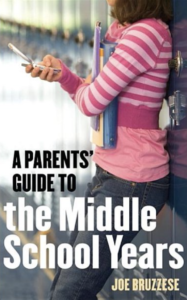Any parent who has a child about to enter middle school knows that it’s a time fraught with fear and trepidation. And we’re just talking about the parents! Luckily, we spoke with our new BFF Joe Bruzzese, author of A Parent’s Guide to the Middle School Years. His awesome book helped assuage our fears about middle school, and we’re sure it’ll do the same for you, too.
Joe, I was really interested in your book because my son is going to junior high next year. I’m already petrified.
You’re not the only one! It’s a shared sense across the parenting nature.
Before we talk about your book, let’s talk about your background. You were actually a middle school teacher.
I was a middle school teacher for ten years. I went to UC Santa Barbara, and taught teachers how to teach. I began doing one-on-one work with families; I would receive requests, particularly from moms, that fell in the 10-14 year-old age group. Parents didn’t know how to deal with their kids wanting independence along with the new academic demands of middle school.
How did the book come to be?
Someone said, “You should write a book,” and I thought, “No! That’s way too much work!” [laughs] I go out now and speak to schools across the nation, primarily middle schools. I share with them how their children can thrive in middle school, and how to stay sane as a parent.
What is it about middle school that freaks parents out?
Middle schools are larger, and there are more kids and administrators. The end result is that they might not feel as safe as they did in elementary school. It’s a huge leap; so many things are happening and it can be overwhelming for them.
Are we talking about the parents here or the kids? [laughs]
Definitely both.
I think the middle school transition is difficult for the child but it’s absolutely traumatic for the parents.
I agree with you 100%. A lot of the anxiety is not what the kids feeling. It might be what the parents are projecting onto the parents.
There you go. I knew it was me.
[laughs] It’s a huge transition. Parents tell me that different from elementary school where you can show up and be the room parent and be present, in middle school, it doesn’t have that same appeal for parents. The perception for parents is, “They don’t want us here anymore.” The principals will tell you that they need you; they’re just not clear on how they want you involved! [laughs] It’s contradictory. The parents come in having played a role where they are the front runners in conversations with teachers, and then you make this rugged transition to let your child step up and take responsibility. That’s the big anxiety. The other one is understanding what kids are going to need socially as they make their way towards independence. Kids still need to respect and treat their parents the way they want to be treated, so they can understand the new rules of the game. If you go in blind, you’re in for a lot of hurt feelings.Let’s talk about the book.
I’ve been told that it’s a practical book with strategies that will help your child succeed academically and socially but give you the tools to help talk with your kids when they don’t want to talk with you. It teaches you how to keep your family moving forward together. There are only six chapters; I wanted to keep it focused on specific topics. One topic is technology; it discusses not only cell phones but the Internet as well. It explains how to keep your children safe online, and also how they are using these tools in a way that might differ from how you use it.
What would you want the big take away to be?
The relationship you build with your child now is the one you will have with them as an adult. If you put into perspective the amount of time it is, it’s only 6 or 7 years until they graduate. These are the great opportunities to build that relationship. Allow your child to make choices and see what the consequences are, and then have a conversation about it. You have to share some guidance but give your kids the opportunities to learn and practice decision-making skills.
What has the response been to the book?
It’s been great! I’ve had schools adopt the book and then give it to incoming middle school students. Schools feel they’re giving parents a resource.
You have two children, one who is already in middle school. How’s it going?
Yeah, it’s tough! [laughs] It only makes it slightly easier because of what I know. It’s such an emotional thing; if you get tied up in it, you lose all sense of reason and logic. Sometimes I have to stop and say, “If I were me telling a parent about this, what would I say? Okay, listen to yourself now.” That helps…sometimes. [laughs]
I think there’s hope for us all.
When parents listen to their kids, and kids keep talking, then kids do great, and the parents do, too.




